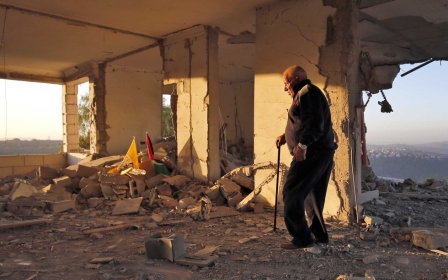'Pushing out Palestinians': Israel installs concrete checkpoints at Old City gate

JERUSALEM - Israel is installing permanent checkpoints at a key entrance to Jerusalem's Old City in order to keep Palestinians with already limited access out, residents tell Middle East Eye.
Construction at the Damascus Gate area - one of the most popular entrances used by Palestinians - started weeks after US President Donald Trump recognised Jerusalem as Israel's capital.
'What we are witnessing are military and police procedures, under the umbrella of security, to push out Palestinians from their city'
- Mahdi Abdul Hadi, head of Palestinian Academic Society for the Study of International Affairs
Palestinians living in Jerusalem say the new checkpoints aim to create "facts on the ground" to change Jerusalem's current status quo as an occupied city.
Mahdi Abdul Hadi, the head of the Palestinian Academic Society for the Study of International Affairs (PASSIA) based in Jerusalem, said: "The checkpoints at Damascus Gate are aimed at paralysing any Palestinian social, religious and youthful movements in this site.
"This is happening with a green light from the new Washington of Trump and some Arab countries."
Daoud al-Ghoul, a Palestinian resident of Jerusalem, said the situation at Damascus Gate comes as the Israeli military now dominates and controls Jerusalem.
"With the concrete checkpoint rooms, the Israeli soldiers will be able to stop and search Palestinians far away from the media cameras," said al-Ghoul. "No one will know what is happening behind these concrete walls."
But local media reported that construction started when two trees were uprooted at the site before the fence and sign even went up.
Creating fear
The area around Damascus Gate - which Palestinians call Bab al-Amoud - is a popular spot where Palestinians gather, drink coffee and sing national songs, as a form of civil protest. It has also been a site of more formal demonstrations and violent clashes between protesters and Israeli police.
In October 2015, during a wave of violence sparked by political tensions, Palestinian youths attempted to stab Israeli military police in separate incidents near the gate. They were shot and killed, with footage of the stabbing attempts going viral.
Since then, the Israeli military has used temporary checkpoints made of plastic sheets and scaffolding to stop and search Palestinians at random using the gate.
Jamil Hidmi, an owner of a flower shop in the Old City, said: "The Israeli authorities are trying to create fear in people of being stripped and searched inside these concrete checkpoints each time they want to enter Damascus Gate."In addition to the checkpoints, Israel has recently installed surveillance cameras, equipped with sound detectors, at the gate.
Al-Ghoul said he fears that Israel will raise flags at the location, altering the historic area and violating a UNESCO resolution which affirms the importance of the Old City and its walls for the three monotheistic religions.
While there are other entrances that could be used, the heightened security on the Damascus Gate adds insult to injury for Palestinians who have been frequently barred from accessing the Al-Aqsa Mosque inside the Old City for years.
'No one will know what is happening behind these concrete walls'
- Daoud al-Ghoul, Palestinian resident in Jerusalem
Palestinians from the West Bank, for example, have not been allowed to visit Jerusalem freely since the Second Intifada in September 2000. Instead, they must apply for permits with the Israeli Civil Administration which typically only gives them out during the month of Ramadan.
Palestinians with Jerusalem IDs who are under the age of 50 are also regularly banned from entering Al-Aqsa during the Friday prayers.
Since Trump's recognition of Jerusalem, residents say security searches - including ID and bag checks - have increased at Al-Aqsa and Damascus Gate.
Abdul Hadi said Israeli authorities have also recently imposed high taxes on properties owned by Jerusalem Islamic Waqf, a Palestinian religious trust, while encouraging Israeli political parties, Jewish schools and organisations to move and work in the Old City.
"First, the Israeli government are translating Trump's declaration of Jerusalem as an Israeli capital on the ground," he said. "Second, it is changing the status quo of Jerusalem as an occupied city and is marginalising the Hashemite custody over Islamic and Christian holy sites by maintaining a high military presence at these Islamic and Christian sites. Jerusalem became a military city. Third, drawing an Israeli map that excludes Palestinian neighbourhoods from the Old City."
He added: "What we are witnessing are military and police procedures, under the umbrella of security, to push out Palestinians from their city."
This article is available in French on Middle East Eye French edition.
Stay informed with MEE's newsletters
Sign up to get the latest alerts, insights and analysis, starting with Turkey Unpacked
Middle East Eye delivers independent and unrivalled coverage and analysis of the Middle East, North Africa and beyond. To learn more about republishing this content and the associated fees, please fill out this form. More about MEE can be found here.







